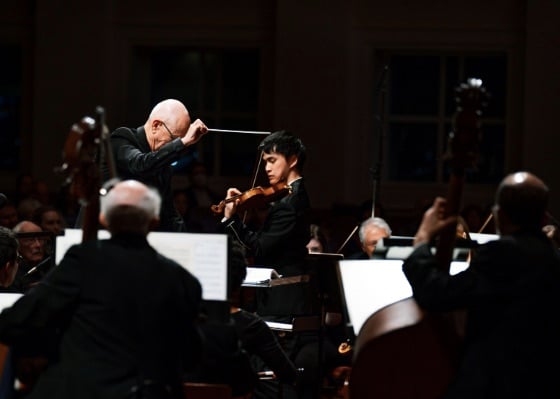The Johns Creek Symphony Orchestra is on a roll. Coming off a high-octane opening night with heavy metal violin maven Mark Wood, it quickly shifted gears and followed up on Saturday night with “American Soundscapes,” a foray into works by American composers and the folk stylings that preceded them. The evening was decidedly mellower in tone but no less enjoyable, with rising violin sensation Kevin Zhu making a captivating guest appearance.
The evening began with a somber announcement of the passing of the orchestra’s conductor and music director, J. Wayne Baughman, following an extended illness. Grief was apparent in the faces of staff and orchestra alike, but all involved soldiered on admirably with conductor John Morrison filling in.
The concert commenced with a series of variations on Charles Ives’ “America” orchestrated by William Schuman. The melody was as timeless and intoxicating as ever and afforded the orchestra a strong and dramatic opening despite some errant moments from the horn section. The lower brass had a noticeable tendency to overplay to the point of distortion and it was jarring amid an otherwise precisely balanced ensemble.
The brass returned to form in the second segment, which featured selections from Edward MacDowell’s “Woodland Sketches.” As the gentle, melody driven work unfolded, it became clear that this was an orchestra that favored listener-friendly fare above technically dazzling or harmonically experimental material.
Such a focus on melody is rather refreshing: In a classical world often consumed by elaborate feats of virtuosity and obscure deep cuts from legendary composers, there is something warm and inviting about an orchestra that places a premium on satisfying the most basic desires of its audience. The resulting experience is akin to classical crossover artists such as Mannheim Steamroller and the Trans-Siberian Orchestra and warrants this orchestra having a much larger presence in the world of Georgia classical music.
“Woodland Sketches” maintains a popular conceptual substrate of the American classical tradition with its emphasis on the natural world. That fascination with rolling hills and sprawling woodlands is born out of the country’s frontier spirit and the understated majesty of MacDowell’s composition — originally written for piano and adapted for full orchestra by other arrangers — captures it in all its Americana glory.

From a performance standpoint, the fun, lighthearted work gives the strings and woodwinds an opportunity for interplay, and it was here that the orchestra shined. Both sections are sonically rich and dialogue well together. In the context of “Woodland Sketches,” the pairing truly conveys the spirit of the work.
Guest violinist Zhu joined the orchestra for German composer Max Bruch’s “Scottish Fantasy,” Op. 46. Despite being a work by a non-American composer, the piece is thematically relevant. Bruch derived the composition from a quartet of Scottish folk melodies, and that importing of traditional folk stylings forms the foundation of the American song form.
In the hands of Zhu, a recent graduate of Julliard and an emerging violin phenomenon at only 22 years of age, those traditional melodies take on a fresh sense of yearning. His interpretation of the work places a particular emphasis on tone production, to such a degree that the merely melodic becomes angelic.
“With each piece of music, I like to make some kind of story,” explained Zhu. “I can take these ideas and images and characters in my own mind and translate them into sounds and colors and different tones on the violin. With this piece, I found it quite simple because you can immediately imagine someone singing those folk tunes. You can think about the landscape of Scotland and the reality of the people living there.”
While much is owed to Zhu’s outstanding skill, his instrument makes its own indelible contribution to the sound. Zhu plays a Stradivarius violin circa 1700, and the instrument carries that signature tone whose re-creation has defied luthiers to the present day. “Stradivari was a great violin maker,” said Zhu. “He captured one of the most complete sounds you can capture in a violin. There’s a great wealth of different voices and colors that you can make with it in addition to its power, its brilliance and its sheer will.”
The orchestra closed out the concert with a performance of Aaron Copeland’s Pulitzer Prize-winning work “Appalachian Spring Suite.” It was a fitting closer that maintained the spirit of the evening.
The Johns Creek Symphony Orchestra’s current seasonal tagline is “unleashing the power of the symphony.” That goal seems to be realized with works that speak as much to the heart as the mind. With two great concerts already under its belt, the season looks poised to soar further into ethereal horizons.
::
Jordan Owen began writing about music professionally at the age of 16 in Oxford, Mississippi. A 2006 graduate of the Berklee College of Music, he is a professional guitarist, bandleader and composer. He is currently the lead guitarist for the jazz group Other Strangers, the power metal band Axis of Empires and the melodic death/thrash metal band Century Spawn.

